Food is big thing in South Korea, it is one of the highlight thing to do when touring the country. This sentiment is especially true in Seoul, the capital city, where food isn’t just a necessity but a cultural experience in its own light. Also, the city boasts a diverse culinary scene that encompasses a blend of traditional and modern Korean dishes, making it a paradise for food enthusiasts. The best part is that food is really affordable too. Lets take an explore of Seoul City Food Delights.
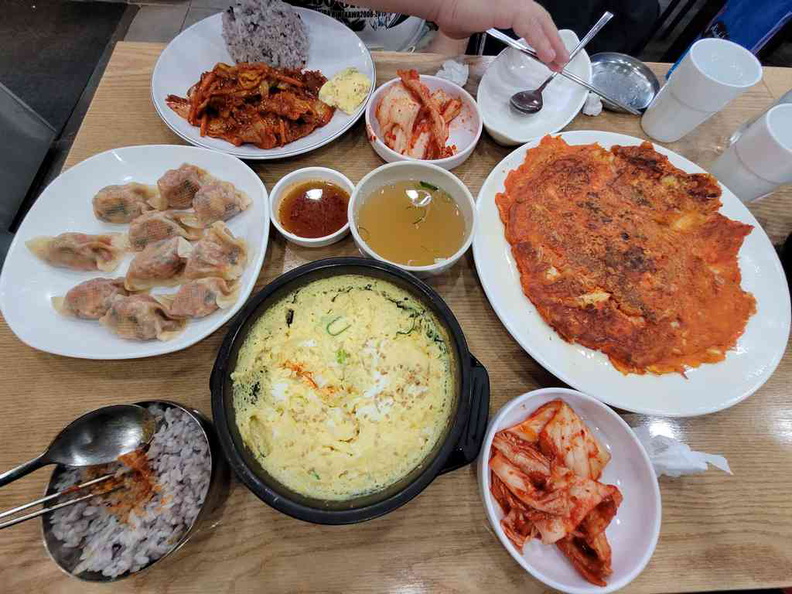
Furthermore, Seoul’s culinary landscape offers a plethora of options. Food selections here ranges from staples dishes like bibimbap, sizzling hotplate-roasted beef, and pork with rice dominate menus. These are often accompanied by classic Korean sides such as Kimchi and pickled vegetables. These dishes provide a rich introduction to the local palate.
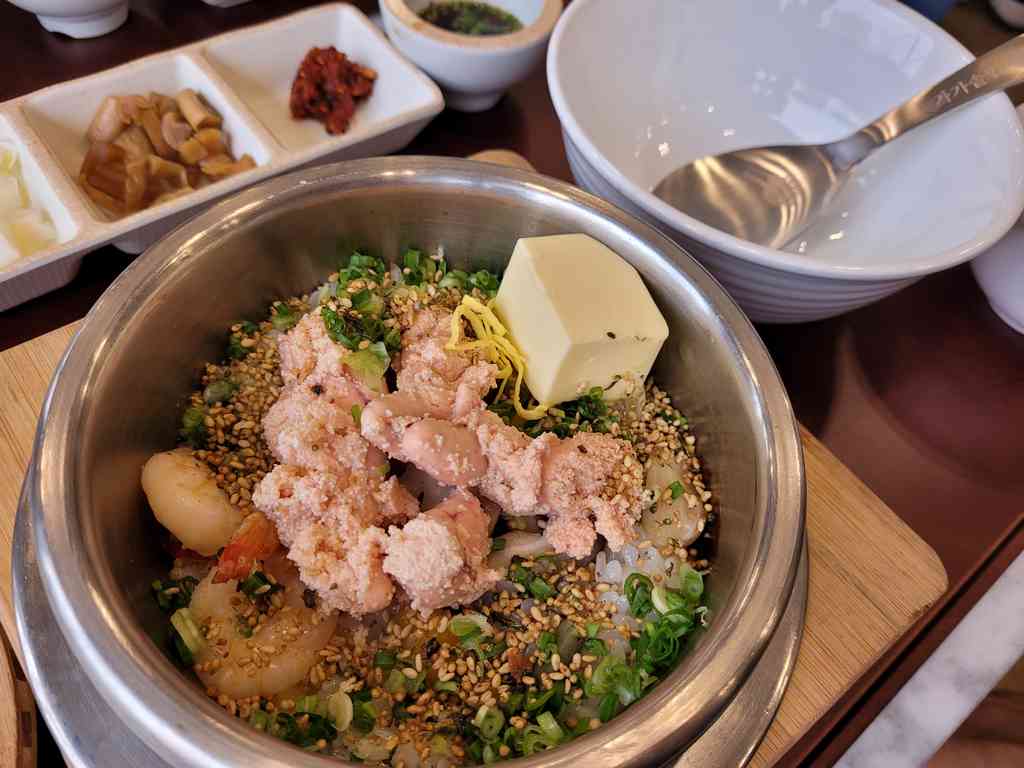
However, the culinary journey doesn’t stop at renowned restaurants. Hidden gems exist in small towns and villages beyond the bustling city. These family-run eateries hold the charm of authenticity and serve home-cooked Korean staples at remarkably affordable prices. It’s astonishing to find that a hearty and satisfying meal can cost as little as 4000 won (approximately S$4).
When shared as a platter, it sets you back under S$8 per person. These culinary treasures can be found in commercialized food courts as well as smaller establishments, providing a truly authentic experience. This beats the offerings by western outlets like Lotteria burger fast food joints.
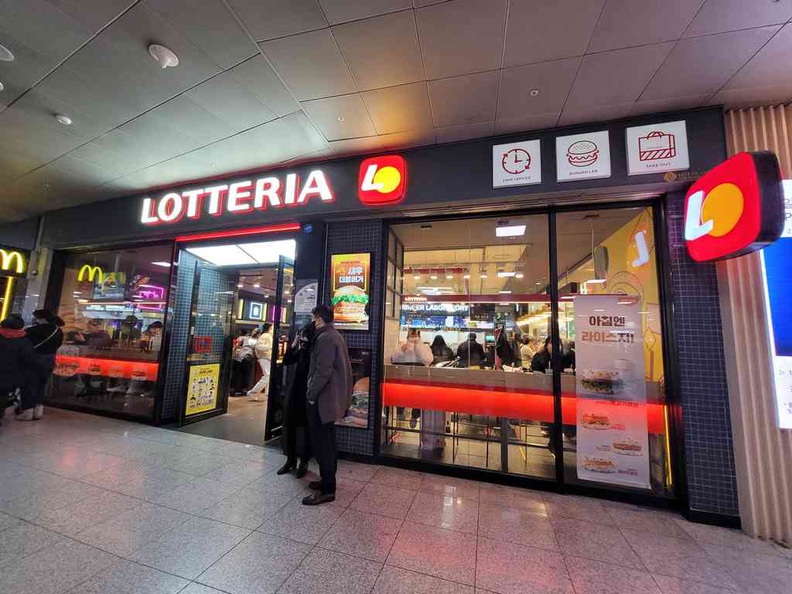
Anything with Kimchi land
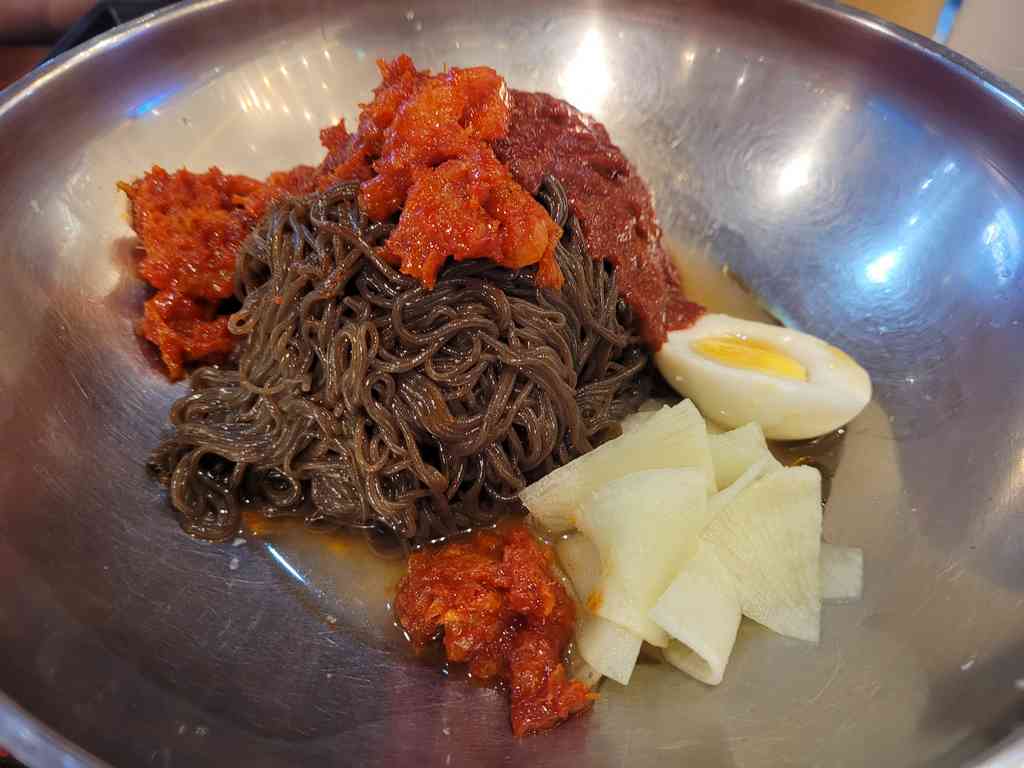
Moreover, undoubtedly, a significant aspect of Korean cuisine revolves around Kimchi. You definitely can’t stray far from Kimchi in South Korea. This fermented vegetable side dish is ubiquitous, gracing almost every meal. Selections includes traditional cabbage Kimchi, radish Kimchi, and cucumber Kimchi.
These are just a few variations that reflect the cultural significance and culinary diversity associated with this staple dish served usually as a condiment. Beyond the classics, innovative renditions like Kimchi pancakes and Kimchi dumplings demonstrate the continuous evolution of this beloved dish.
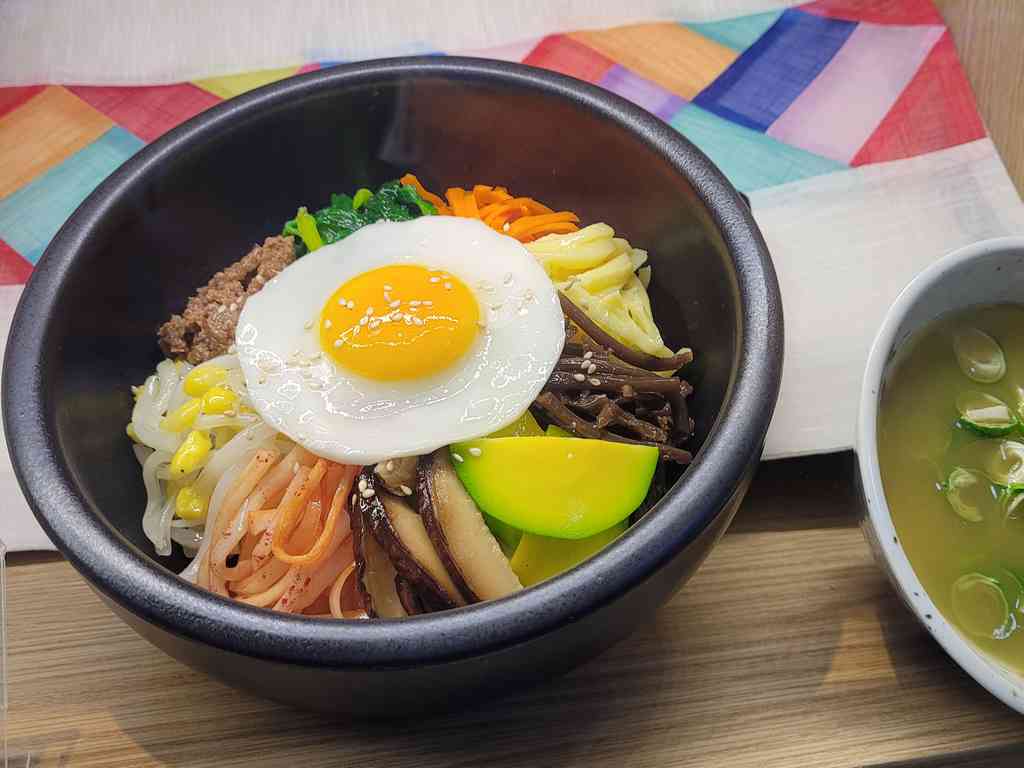
Bibimbap is a well-known rice staple in Korean cuisine. This dish is served in several different ways, on a hot stone bowl or in a plastic one. The popular Korean rice dish is typically served in a bowl with a variety of vegetables, meat, and a fried egg on top.
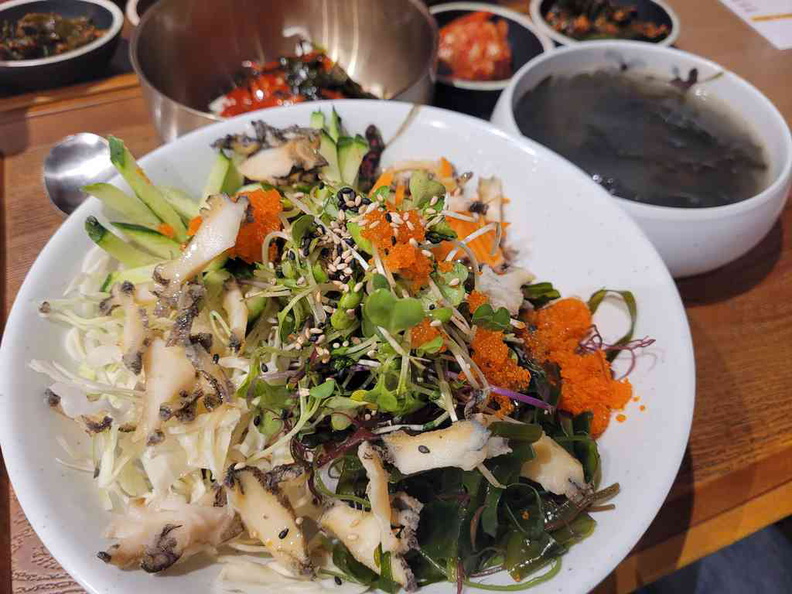
Also, Bibimbap is mixed with spicy gochujang sauce before consumption. Seoul takes pride in its visually stunning and delectable Bibimbap offerings. Variations now include vegetable-only or rice-less versions to cater to changing dietary preferences. Increasingly, you start to find vegetable-only Bibimbap or even rice-less ones as new developments.
Korean BBQ
Furthermore, Seoul’s reputation as a haven for meat lovers is well-earned, thanks to its Korean BBQ scene. Here, diners can partake in the experience of cooking and grilling your own meat with a grill at the center of every diner’s table. You can find a wide variety of meats such as beef, pork, and chicken, along with an array of side dishes and dipping sauces.
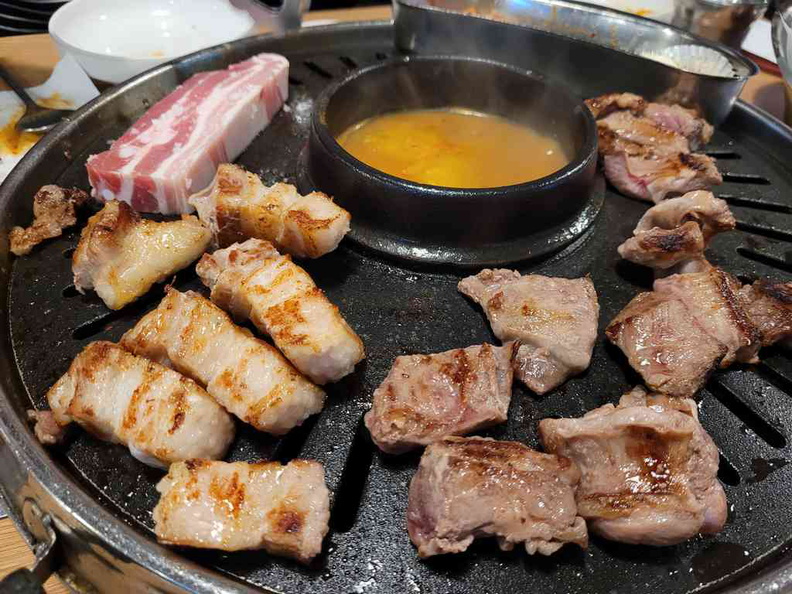
Moreover, Korean BBQ is tad a must-try delight which can make you pretty full for not a lot of money. Remarkably, this indulgence doesn’t come at a hefty cost, with BBQ buffets often available for under 18000 won (about S$18) per person, offering a night of savory delights.
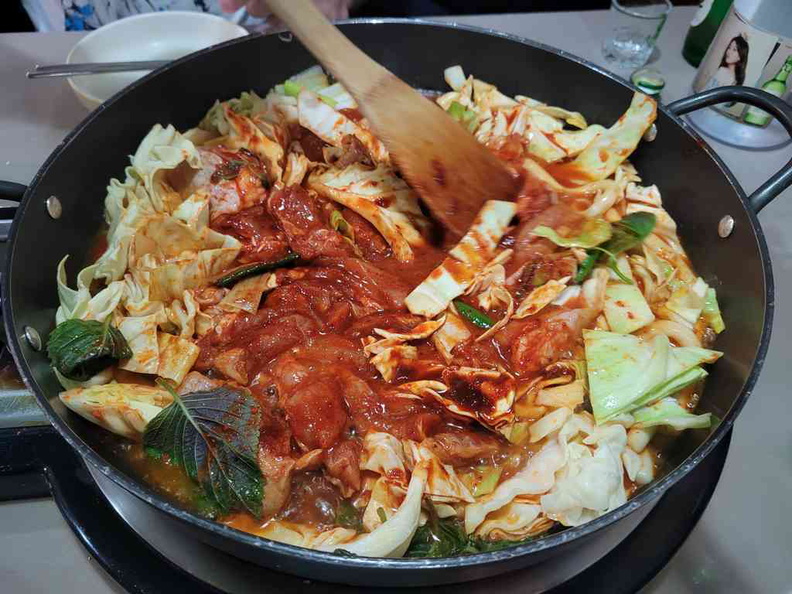
Talking about BBQ, You can find more less-seen adventurous dishes like Cheese Buldak. Though not common in Singapore, this pan-fried wonder is reminiscent of Japanese okonomiyaki, cooked on a personal frying pan. There are also larger variants which can feed 2-3 pax. This dish can be enjoyed with the addition of a cheese fondue bread bowl and is best washed down with sides of Korean beer too.
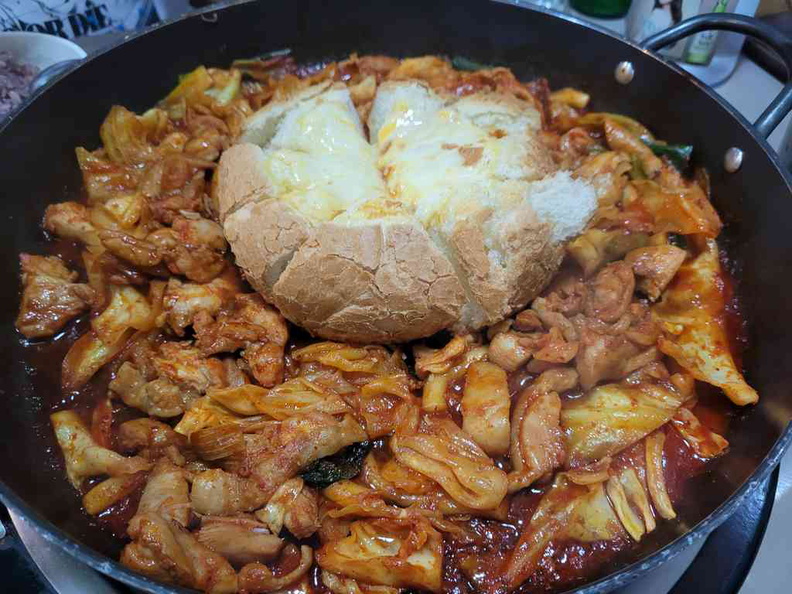
Korean night street food
Korean street food adds another layer of excitement to Seoul’s food scene. The city is dotted with street food stalls offering a wide range of delicious and affordable food street.
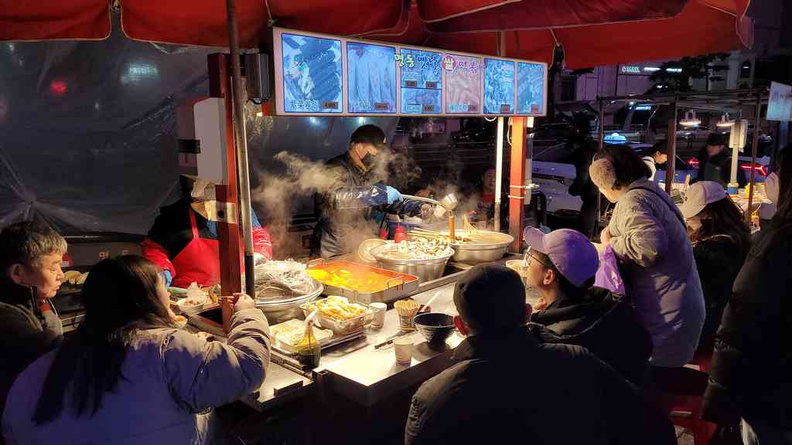
Also, it is not uncommon to find night markets which opens till late (11pm) in Seoul. The market is a great source of street food and merchandise with an array of delectable and affordable snacks.
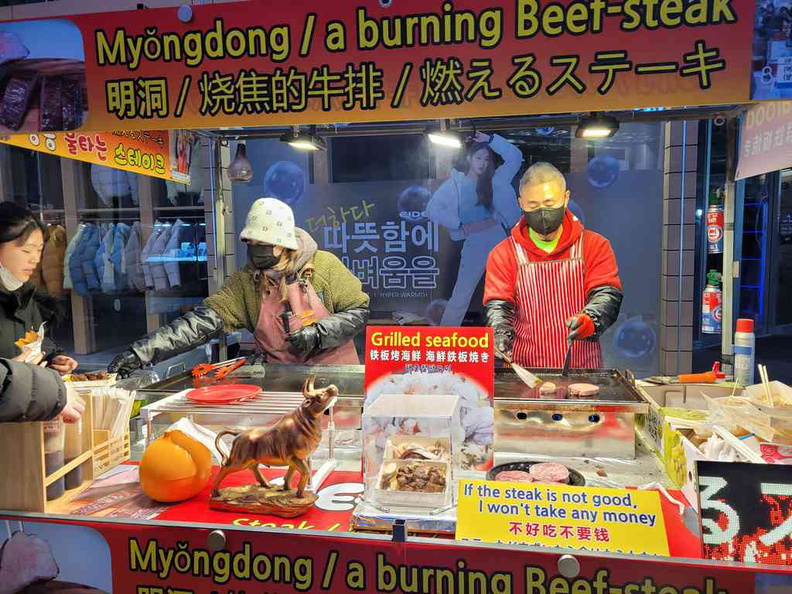
Here, popular street food items include items from spicy rice cakes (tteokbokki) to dumplings (mandu) and sweet pancakes (hotteok), the streets are a treasure trove of irresistible treats. You can typically purchase them direct to eat immediately from street side stalls. And while at it, you can wash it all down with smooth Bingsu snow ice desserts too.
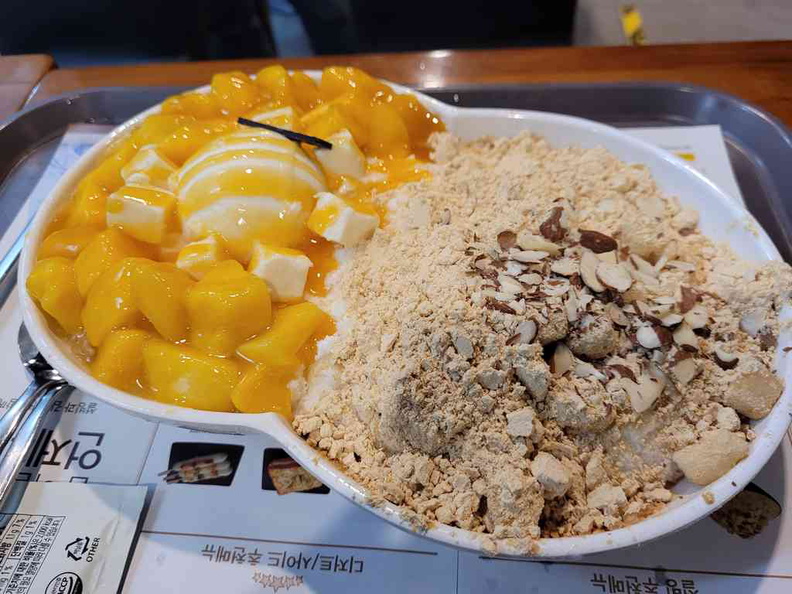
Moreover, a less popular item would be Gimbap. Gimbap is a Korean version of sushi, where rice and various fillings are rolled in seaweed sheets. It is a convenient and affordable meal option which is a good meal-to-go. It that can be found in many street food stalls and convenience stores in Seoul. Though you may notice that most places like convenience stores tend to offer Japanese sushi instead this Korean variant. Still, you do not miss much forgoing Gimbap.
Staples for all budgets
Additionally, Seoul offers a range of affordable staples for all budgets. In addition to street food options, there are many casual restaurants. These are known as “bunsikjeom,” where you can find inexpensive and delicious Korean dishes like kimbap, tteokbokki, and mandu. There are also affordable buffet-style restaurants where you can enjoy a variety of Korean dishes at a fixed price.
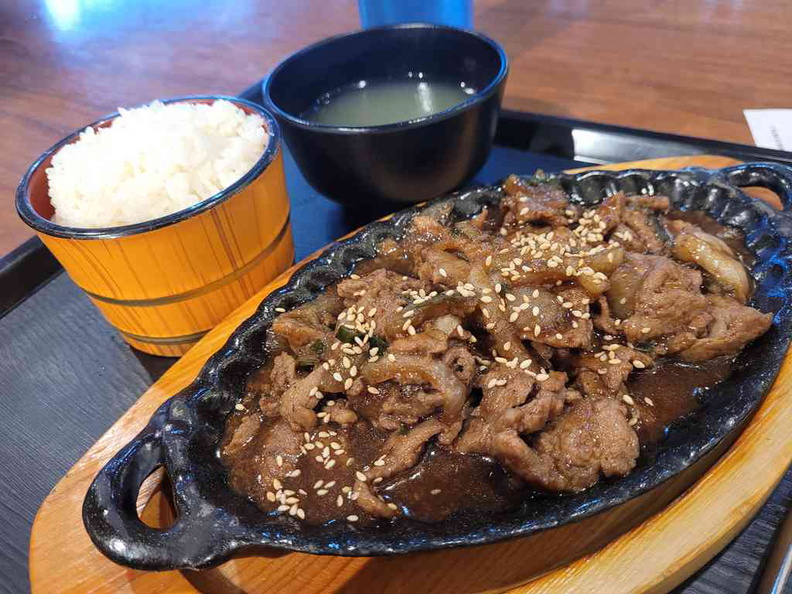
Furthermore, Jjimdak is a nice quick dish for busy people. It is a flavourful Korean braised chicken stir-fry dish cooked with soy sauce, vegetables. Also, it is typically served with glass noodles as the dish’s staple carbohydrate. Stores can typically prepare this stir-fry fresh and hot rather quickly. It is great for busy people on-the-go, Jjimdak is a popular comfort food in Seoul and is often enjoyed with a group of friends or family.
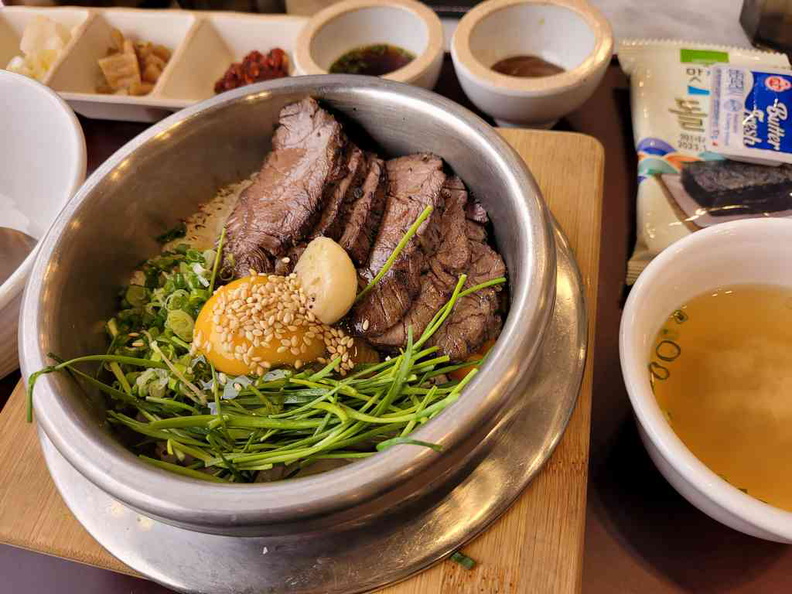
Soupy dishes
Moreover, their Samgyetang Ginseng chicken is one to go for. This Korean staple is also widely served in Korean restaurants and coffee shop eateries in Singapore too. In a nutshell, Samgyetang is a nourishing Korean dish consisting of a whole young chicken stuffed with rice, ginseng, and other medicinal herbs. One worthy to try is Myeongdong noodles, a popular spot near Seoul Kyoja city hall with locals and tourists alike.
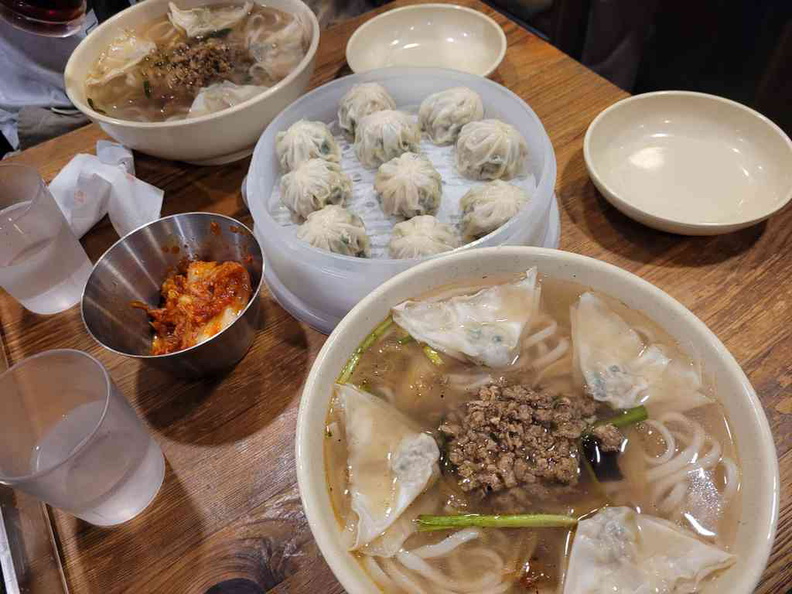
Also, it is known for its health benefits, the cooling effects of chicken soup is balanced up by the heaty effects of the ginseng it is boiled in. Hence the soupy dish can be enjoyed all year long. This is especially on cold winter as a hot dish to warm yourself or for its cooling effects during the hot summer months.
Also, on soupy dishes, if you desire a more soupy offering, their Sundubu-jjigae is a good choice. It is a spicy soft tofu stew that is a favourite among locals, made with soft tofu, vegetables, mushrooms, and a spicy broth. It is often served with a bowl of steamed rice.
Wrapping up, you can’t stray far from the army stew pot. It has its roots being invented from personnel in the Korean army having a hotpot of what army rations they have to put into a pot. This includes an eccentric mix of instant noodles ramen, sausages, cabbage and luncheon meat to name a few.
Ramen, a special mention
Last but definitely not least, Korean ramen. It is known as “ramyeon” in Korean, has a fascinating history rooted in the post-war era. Introduced to South Korea during the mid-20th century, ramyeon was initially inspired by Japanese instant noodles. However, over time, Koreans developed their distinct flavor profiles and variations that catered to their palate.
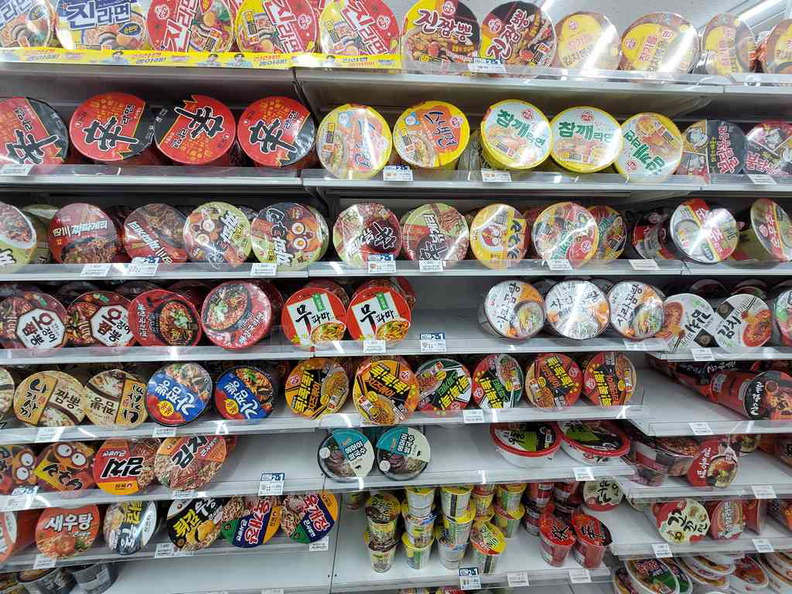
The fusion of Korean spices, vegetables, and meats transformed ramyeon into a uniquely Korean culinary delight. This dish gained popularity due to its affordability, convenience, and delicious taste. This makes it a beloved staple in Korean households and a symbol of comfort food.
Among the most popular brands of Korean ramyeon are Nongshim, Ottogi, Samyang, and Paldo. Also, these brands offer a wide range of flavors and styles. This ranges from traditional beef or chicken-based broths to more adventurous and spicy options like kimchi or buldak (fire chicken) ramyeon.
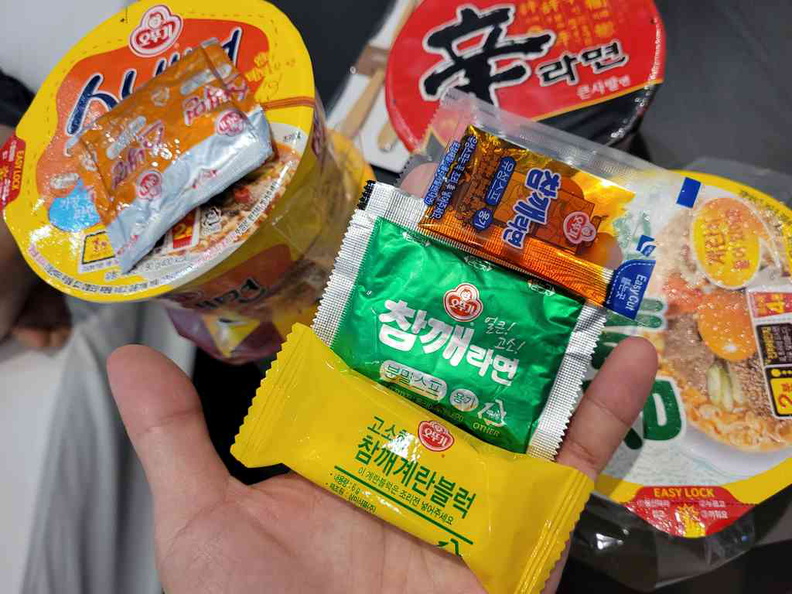
Also, what sets Korean ramyeon apart is the rich and flavorful broth. This, combined with chewy noodles and often accompanied by various toppings like dried seaweed, vegetables, and even egg. The greatness of Korean ramyeon lies in its ability to provide a quick, satisfying, and flavorful meal that captures the essence of Korean cuisine in an easily accessible package.
Cheap and good ramyeon
Basic instant ramyeon bowls can be found in pretty much all over South Korea. You can find them in supermarkets, gas stations and even every convenience store in the city of Seoul. This means they are everywhere, considering you can find a convenience store pretty much every block in the city. Also, these affordable instant meals can be found for as low as 1,000 won (under S$1) to 2,000 Korean won on average, such as in South Korea Daiso store too.
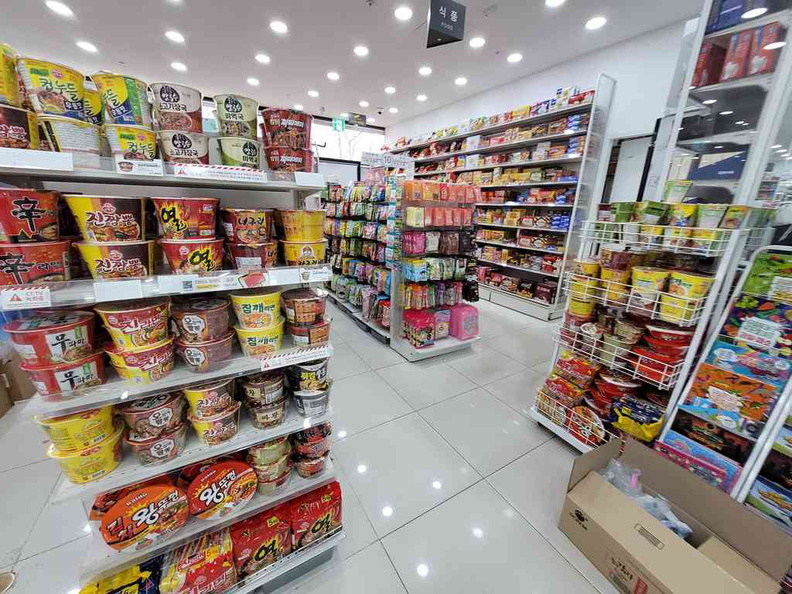
Moreover, most convenience stores will provide chopsticks and hot water in-store, with bigger stores having an interior dine-in seats and tables too. Also, go for their 1500 won variants for best value to condiment offerings. This makes it a popular to-go choice for students, busy professionals, and anyone looking for a quick and economical meal or late night supper.
Additionally, higher-end or premium ramyeon options are available in supermarkets or specialty shops for those seeking a more elevated ramyeon experience. Overall, Korean ramyeon has become a cultural icon that blends convenience, taste, and affordability, reflecting the dynamic culinary landscape of South Korea.
Wrapping up
All in all, a visit to Seoul offers an immersive and delectable culinary journey that caters to diverse preferences and budgets. From indulging in Korean BBQ to exploring street food stalls and savouring hearty soupy dishes, the city truly captures the essence of South Korean cuisine.
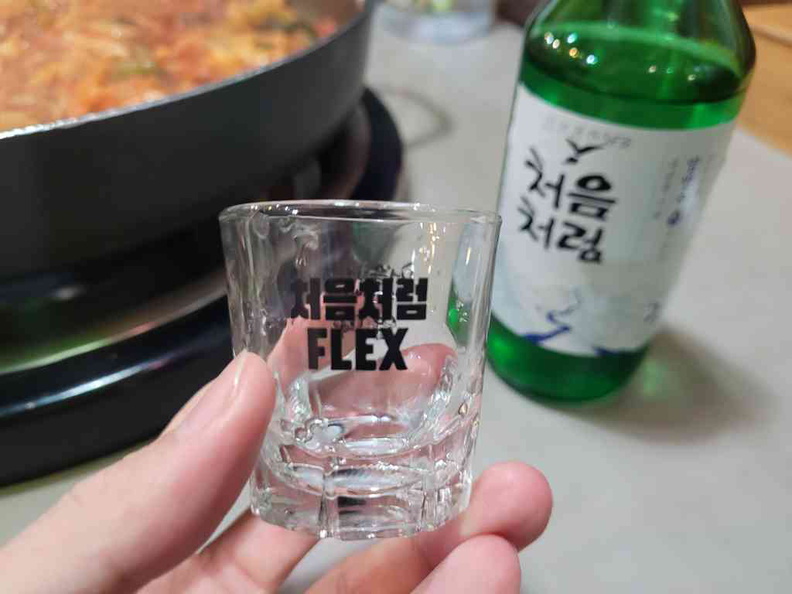
Whether you’re a street food lover, a fan of traditional dishes, or an adventurous food explorer, the city of Seoul has something to offer without straining your budget. Indeed, the foodie goodness of Seoul is a remarkable experience that lingers in the memory long after you’ve left the city’s vibrant culinary landscape behind.

[…] South Korean Seoul City Food Delights […]